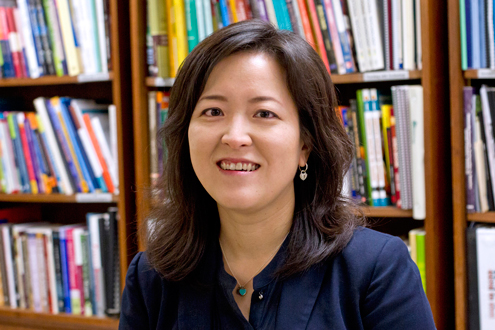
Jina H. Yoo, associate professor of communication at UMSL, conducted a study that finds watching the NBC reality show “The Biggest Loser” can spur anti-fat attitudes. (Photo by August Jennewein)
People who watch the NBC reality weight-loss show “The Biggest Loser” are prone to have negative opinions of obese people, according to a study by Jina H. Yoo, associate professor of communication at the University of Missouri–St. Louis.
Yoo examined antecedents and outcomes of watching the show, what factors influence people to watch the program and how exposure to the show shapes viewers’ beliefs and attitudes about obese people.
According to her findings, the show foments anti-fat attitudes by leading viewers to believe weight control is up to the willpower of individuals. This negative perception is fueled by viewers repeatedly watching obese contestants lose up to 100 pounds in three months.
“The show frames obesity as a matter of personal responsibility and behavioral solutions, ignoring societal or environmental contributors,” Yoo said.
The study also found that individuals who are more concerned with their weight watch more episodes of the show.
Since its debut in 2004, “The Biggest Loser” has become a hit, drawing huge ratings and becoming one of the most popular reality television shows in the U.S. The show features overweight contestants competing with each other to lose the most weight for the title of “The Biggest Loser” and a grand prize of $250,000. Season 14 of the show premiered Jan. 6. In addition to adult contestants, this season features three teenagers who are struggling with their weight.
Often, contestants on “The Biggest Loser” drop more than 10 pounds in a week, something medical professionals say can create dangerous expectations among audiences. Critics of the show argue that the program promotes unhealthy, unrealistic and unsustainable methods of weight loss.
The last 20 years has seen a dramatic increase in obesity in the United States. In 2009-2010, more than 78 million U.S. adults and about 12.5 million U.S. children and adolescents were obese, according to figures from the Centers for Disease Control and Prevention. In 2011, 30 percent of adults in Missouri were considered obese.
Yoo’s conclusion is that “The Biggest Loser” is not only ineffective and unsustainable in terms of losing weight, but that the show also creates and exacerbates an obesity stigma by blaming individuals for their adverse health outcomes.
Yoo’s findings were based on an online survey of nearly 700 undergraduate students. Of the survey respondents, 202 were male and 482 were female. The ethnic makeup of the sample was 60 percent Caucasian, 28 percent African American, 6 percent Asian American, 3 percent Hispanic and 2 percent other.
The study, “No Clear Winner: Effects of The Biggest Loser on the Stigmatization of Obese Persons,” was published in June 2012 in the journal Health Communication.
Media Coverage:
Daily Mail Online (UK)
International Business Times
Nature World News
Medicalxpress.com














